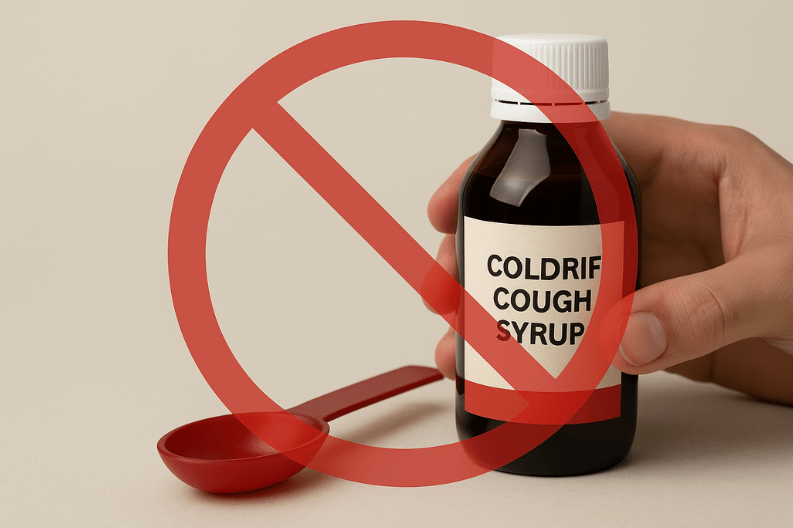New Delhi, October 8: The Government ban on Coldrif Cough Syrup comes after a heartbreaking tragedy where more than 20 children lost their lives due to contaminated medicine. The syrup, made by Sresan Pharmaceuticals in Kancheepuram, Tamil Nadu, contained dangerous chemical levels far above safety limits. This disaster has pushed the government to take urgent action to protect public health.
The Health Ministry said the Tamil Nadu state drug authority will decide whether to cancel the company’s license. Investigations revealed that Coldrif contained 48.6% diethylene glycol, a toxic chemical known to cause kidney failure and death. The legal limit for this substance is just 0.1%, making the contamination extremely severe.
As soon as the news spread, several states, including Punjab, Kerala, Madhya Pradesh, and Arunachal Pradesh, banned the syrup. Others, such as Telangana, Karnataka, and Maharashtra, issued public warnings. This quick action shows how seriously states are treating child safety after the tragedy.
The Central Drugs Standard Control Organization (CDSCO) recommended canceling Sresan Pharma’s license. However, the final decision rests with the Tamil Nadu Food and Drug Administration (FDA), which oversees all drug manufacturing in the state. Health officials said the company’s violations were too serious to overlook and demanded strict punishment.
During factory inspections, investigators discovered containers of diethylene glycol that were not properly recorded. Reports claim the company used excessive amounts of this chemical in production, revealing major negligence and unsafe practices.
In response to the crisis, Dr. Sunita Sharma, Director General of Health Services, issued a national advisory. She urged doctors and healthcare professionals to be cautious when prescribing cough syrups to children. Dr. Sharma explained, “Most coughs in young children are mild and go away without medicine.” She also warned that cough syrups should not be given to children under two years old and should be prescribed only after a doctor’s careful examination.
The tragedy has raised serious concerns about India’s pharmaceutical safety standards. Health experts now demand stronger monitoring and stricter penalties for companies that break safety laws. They stress that such failures destroy public trust and endanger lives.
The Health Ministry has pledged to improve its quality control system. Officials plan to review drug manufacturing rules to ensure every company performs proper testing and labeling before selling products.
Families who lost children are demanding justice and government support. Public anger is rising across India, with citizens calling for stronger oversight and accountability. The government has promised financial and legal assistance to the affected families.
Pharmaceutical analysts say this case should mark a turning point. India must strengthen drug safety laws, ethical manufacturing, and surprise inspections to protect the public, especially children. Experts believe that a wider network of certified testing labs is essential for preventing future disasters.
In conclusion, the Government ban on Coldrif Cough Syrup is more than a punishment for one company; it is a call for nationwide reform. The tragedy has reminded everyone that safety, transparency, and accountability must come first in the pharmaceutical industry. With tougher laws and better enforcement, India can build a safer and more reliable healthcare system for all.



